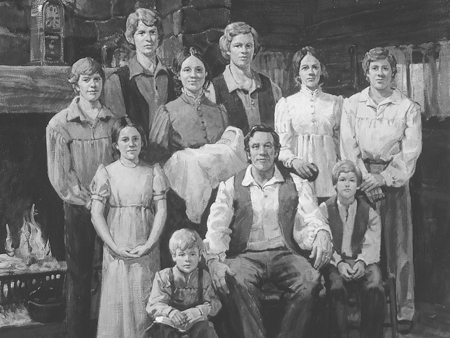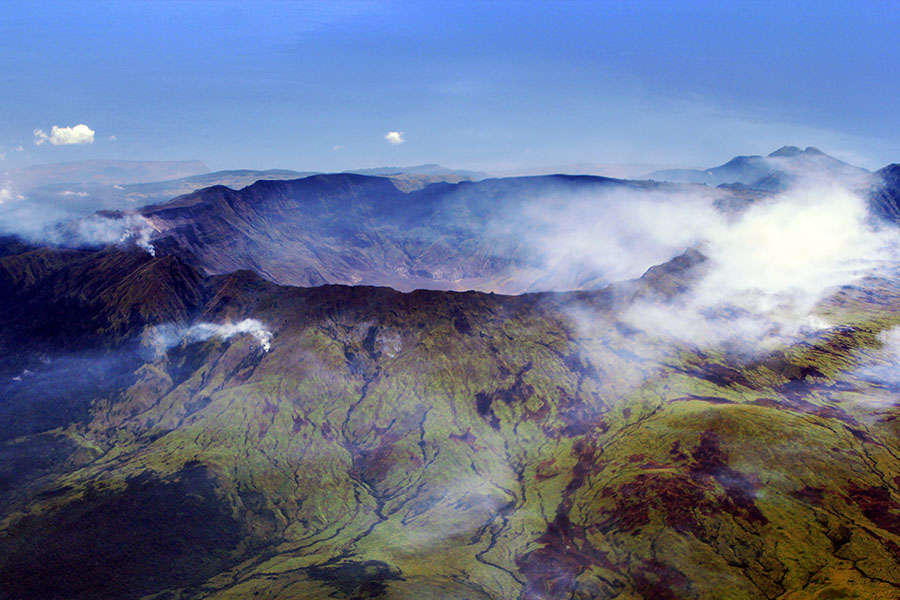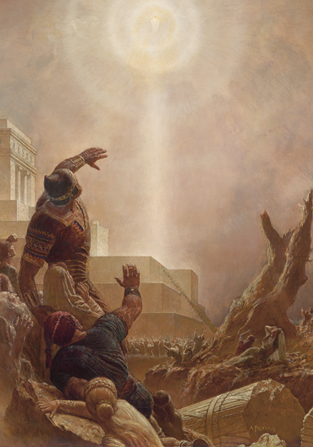How Joseph and Lucy Smith Were Guided by the Hand of God
I stare at the summer sun on the blue ocean water, a little surprised to be moving back to a place I thought we were leaving forever.
I’ve often pondered about how God guides our lives and moves us from adventure to experience and on to wisdom.
But is every opportunity really the hand of God giving us a chance to be more like Him? Maybe so. Often in hindsight, life’s challenges are evidence of divine guidance.
I wonder if Lucy and Joseph Smith, Sr. felt guided by God.
Viewing their family struggles and migration from a 21st century vantage point, it is clear their lives were definitely guided by God.
Joseph and Lucy’s early marriage seemed fraught with failed migratory advancements. They married in 1796 and by 1813, they moved locally 9 times, apparently due to economic stress and unsuccessful business prospects. By 1813, they lived in Norwich, Vermont, in the same general area they’d lived all of their married life.

How wonderful it is that we have record of Joseph and Lucy’s faith in God!
Lucy’s Covenant to God
During a stint as mercantile owners in Randolph, Vermont, from 1802-1803, Lucy fell gravely ill with tuberculosis, which claimed the lives of two of her older sisters.
Lucy recorded,
“I made a solemn covenant with God that if He would let me live I would endeavor to serve him according to the best of my abilities. Shortly after this I heard a voice say to me, ‘Seek, and ye shall find; knock, and it shall be opened unto you. Let your heart be comforted; ye believe in God, believe also in me.’ . . .
“As soon as I was able I made all diligence in endeavoring to find someone who was capable of instructing me more perfectly in the way of life and salvation. . . .
“I went from place to place for the purpose of getting information and finding, if it were possible, some congenial spirit who could enter into my feelings and thus be able to strengthen and assist me in carrying out my resolutions. . . .
“I said in my heart that there was not then upon earth the religion which I sought. I therefore determined to examine my Bible and, taking Jesus and His disciples for my guide, to endeavor to obtain from God that which man could neither give nor take away. . . .
“At length I considered it my duty to be baptized and, finding a minister who was willing to baptize me and leave me free in regard to joining any religious denomination, I stepped forward and yielded obedience to this ordinance” (Lucy Mack Smith, History of Joseph Smith, ed Preston Nibley (Salt Lake City: Bookcraft, 1958), pp 34-36).
After moving to West Lebanon, New Hampshire, in 1811, Lucy seemed to excitedly “contemplate, with joy and satisfaction, the prosperity which had attended our recent exertions” (Ibid, p 51).
Joseph Smith, Sr.’s Dreams
During this peaceful time, Joseph Smith, Sr. experienced two vivid, life-changing dreams.
“In the first dream Joseph found himself traveling through a barren field of dead timber with a spirit who told him the field represented the world without religion. Joseph was told he would find a box of food which if eaten would make him wise. He tried to partake but was prevented from doing so by horned beasts.
He told Lucy he awoke trembling but happy and that he was now convinced that even the religious knew nothing of the kingdom of God.
Later in 1811, Joseph, Sr., experienced a second profound dream that related to his family. It was much like Lehi’s dream of the tree of life.
He found himself following a path to a beautiful fruit tree. As he began to eat the delicious fruit, he realized that he must bring his wife and family to the tree so they could enjoy it together. He went and brought them, and they began to eat.
He reported that ‘We were exceedingly happy, insomuch that our joy could not easily be expressed.'”
The Year Without a Summer
Unfortunately, the sweet, momentary, respite turned from joy and prosperity to despair, as a typhoid epidemic descended on the upper Connecticut valley, killing 6,000 people.
Joseph and Lucy’s children were stricken with the dreaded disease. Ultimately, and miraculously, all of the children recovered.
But, Joseph Smith Jr.’s infection settled deep in his leg bones. This precipitated the well-told story of a divinely inspired surgeon’s state-of-the-art surgery on Joseph’s leg. Joseph, unaided by anesthesia or alcohol, agreed to the surgery if Lucy left the room and he could cling to his father’s arms. While the surgery successfully removed the infection, young Joseph’s recovery took three years.
In 1816, after three successive crop failures, the Smiths abandoned their native Vermont for New York. This move brought Joseph Smith, Jr. to the vicinity of the Sacred Grove.
One particularly intense reason for crop failures was an 1815 volcanic eruption of Mount Tambora in Sumbawa, Indonesia. Volcanic ash blocked the sun’s rays for almost a year.

Keith Brown’s detailed article “Joseph Smith Family and the Year without a Summer” noted the eruption’s widespread destructive effect.
“The crop failure in New England at that time is also attributed to the eruption of Mount Tambora. Prior to the eruption, the corn crop was flourishing. By the summer of 1816, it was reported that the corn crop had ripened so poorly that only about a quarter of it was useable as a food source. As a result of the crop failures in New England, Canada, and parts of Europe, the price of wheat, grains, meat, vegetables, butter, milk, and flour rose significantly.”
Snow fell in New England during July and August, and unseasonable frosts killed what little crops had taken root. The Smith family lost their crops, and then their farm in Vermont.
When they left, they were considered “indigent,” but so were up to 15,000 others who suffered the same fate. People in the Northeastern parts of the United States pushed Westward in search of sun and fertile lands.
I can’t imagine such catastrophic events forcing me to flee my home searching for food.
Was It the Hand of God?
Was this natural disaster guided by God? It ultimately propelled the Smiths to New York and Joseph Smith, Jr. to the proximity of the sacred grove, but why affect the entire earth to have the Smith family move?
Divine guidance is prevalent in the life of covenant people. There are so many examples of how God guides people in the scriptures. Why not use one of the familiarly tried and true methods for the Smith’s move?
Why not send an angel to Joseph Smith, Sr. like the one commanding Joseph and Mary to flee to Egypt?
Why not prompt the Smiths like He did when the Brother of Jared or Lehi were commanded to leave Jerusalem?
He could have initiated the move through family or neighbor hostility as experienced by Nephi or David, Alma the Elder or Abraham, or the Saints prior to their westward migration.
He could have just sent someone like Ammon who helped the people of Limhi escape Lamanite bondage and return to Zarahemla or Elijah who was sent to save the widow of Zarephath.
Dreams seem to have been the easiest means to warn the family, since Joseph Smith, Sr. was experienced in recognizing sacred dreams.
Instead, it was a cataclysmic event, and basically unidentified at the time, that precipitated their move.
One scripture story experiencing this broader worldwide scope is Noah when the fountains of the deep broke open and flooded the earth.
Another story also comes to mind—when after three days of darkness on the American continent, the resurrected Savior descended in glorious light. The devastation of upheaval and vapors of smoke gave way to Divine Illumination.

Similarly, the year without a summer, a time of physical and spiritual vapors of thick darkness and misery, ultimately paved the way for Heavenly light when young Joseph Smith entered a grove of trees to pray. God the Father and His Son, Jesus Christ, descended in glorious light in answer to Joseph’s prayer. And the dispensation of the fullness of times, and light, began.


